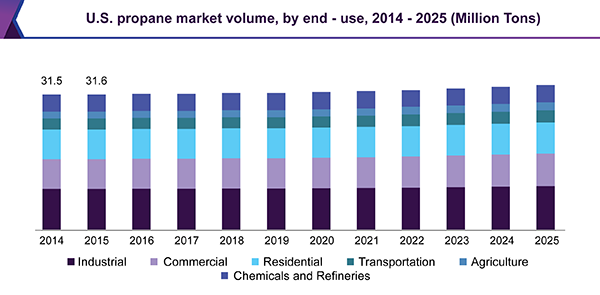Insightful Analysis of Propane Market Trends and Their Implications for Delivery Services

The propane market is dynamic, with various factors influencing its volatility. For propane delivery companies, understanding these market trends is not just beneficial – it’s essential for maintaining competitiveness and optimizing operations. This analysis aims to shed light on the current market trends in the propane industry and explore how these trends could affect delivery services, enabling companies to strategize accordingly.
Current Market Trends in the Propane Industry
1. Fluctuating Prices:
One of the most noticeable trends is the fluctuation in propane prices. Influenced by factors such as crude oil prices, supply and demand, geopolitical events, and market speculation, these variations can significantly impact a delivery company’s bottom line. Understanding the reasons behind price changes can help companies better anticipate and mitigate risks associated with cost volatility.
2. Environmental Regulations:
Increasing global emphasis on environmental conservation has led to stricter regulations on fuels, and propane is no exception. These policies often encourage cleaner energy sources, which could potentially work in favor of propane, as it’s considered cleaner than other fossil fuels. Delivery companies need to stay abreast of these regulations since they could herald increased market demand or necessitate changes in operation standards.
3. Technological Advancements:
The integration of new technologies in the propane industry, such as digital tank monitoring and advanced fleet management systems, is revolutionizing service standards. These innovations are setting a new trend where companies are expected to offer real-time service updates, automated scheduling, and enhanced safety measures.
4. Shift in Consumer Preferences:
More consumers, especially within the younger demographic, are showing a preference for companies that align with their values, such as environmental conservation and premium service delivery. They are also leaning towards providers that offer transparent pricing, online service capabilities, and consistent communication.
Implications for Delivery Services
1. Need for Strategic Pricing:
With the constant fluctuation in propane prices, delivery companies must develop strategic pricing methods. This strategy might involve fixed-rate plans, pre-buy options, or price caps that help customers budget more effectively while allowing companies to stabilize their revenue.
2. Adapting to Technological Expectations:
As the market moves towards advanced technological integration, delivery services need to invest in modern systems. These investments can improve service efficiency, enhance safety compliance, provide competitive customer service, and, importantly, meet the growing customer expectation for technology-based service enhancements.
3. Compliance and Beyond:
Adhering to environmental regulations is no longer sufficient. Companies are now expected to take proactive steps in emphasizing their commitment to environmental stewardship. This initiative can be demonstrated by adopting greener practices, participating in carbon offset programs, or engaging in community environmental projects.
4. Aligning with Consumer Values:
To remain competitive, propane delivery services must recognize and align operations with the evolving values of their consumer base. This alignment includes transparent communication, flexible services, community engagement, and an evident commitment to sustainability.
Strategic Responses for Propane Delivery Companies
In light of these trends and implications, propane delivery companies must adopt a forward-thinking approach to stay relevant and competitive. Strategies may include:
• Investing in employee training to improve service delivery and compliance with evolving environmental and safety regulations.
• Engaging in partnerships with technology providers to upgrade service delivery processes.
• Developing a transparent communication strategy that informs customers of price determinants, service enhancements, and the company’s commitment to shared values.
• Implementing flexible pricing strategies that consider market fluctuations, customer expectations, and company sustainability.
Conclusion
The propane market will continue to evolve, influenced by various internal and external factors. For propane delivery companies, success lies in understanding these trends, anticipating their implications, and adopting strategic, agile responses. By doing so, these companies will not just withstand the currents of change but will thrive, setting new standards in service delivery, operational efficiency, and customer satisfaction within the industry.














